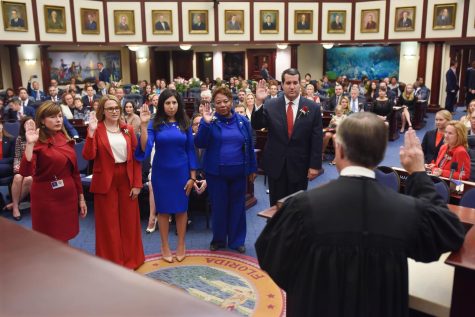Isidor Feinstein “I.F.” Stone, widely considered one of the best investigative journalists of the mid-20th century, once said, “If you want to know about governments, all you need to know is two words: Governments lie.” He even went so far as to say, “All governments are run by liars and nothing they say should be believed.”
So, if an acclaimed journalist believed that government had an inherent total lack of integrity, why would anyone, let alone young people, run for political office today.
Brookings Institute research suggests that the “overwhelming majority of 13 to 25-year-olds view the political system as ineffective, broken, and downright nasty.”
According to a 2021 Pew Research poll, Americans “just about always” trust the government to do what is right only 2% of the time, and a 2015 Washington Postarticle by Shauna Shames found decreased trust of government among 18 to 29-year-olds.
One of Shames’ interviewees gave a startling response regarding his desire to run for political office, saying the job would take him hostage rather than being an enjoyable occupation.
“I … (would) risk capture by going into a political process as corrupted, and sclerotic, and generally putrescent as the American one, so full of money,” the interviewee said.
If there is a cratering lack of trust among relatively young citizens who would rather stay away from politics, why are there record numbers of millennials running for office around the United States?
According to the Millennial Action Project (MAP), which strives to “activate young leaders to bridge the partisan divide and transform American politics, there were 236 candidates running for Congress in 2020 who were under the age of 45; of those, 123 were “true” millennials born between 1979 and 1996, a 266% increase from 2018.
One explanation, and possibly the best explanation, is that the younger generation feels they have no say in matters and decisions that the same older politicians continue to make and want to be the trailblazer of change, as Executive Director and COO of MAP Layla Zaidane said.
This question is why @MActionProject exists. Let me fix the answer: we need more young people in office. #VPDebate
— Layla Zaidane (@layla_says) October 8, 2020
“We have started to understand how our actions can now lead to change, and how we can leverage technology and leverage the power of social media to do that,” Zaidane said. “And of course, in a COVID era, where young people are running for office, that gives them a massive edge.”
David Kim, 37, who ran for U.S. House California District 34 in 2020, believes younger people ought to run for office because current decisions will mostly affect the younger generation.
“The reality is that the consequences and ramifications of the decisions that are being made will be felt by us,” Kim said. “So, wouldn’t it make sense for us to legislate for our future?”
Luke Negron, 27, who ran for U.S. House Pennsylvania District 18 in 2020, said he ran because the young generations are the people most hurt by current political decisions at the local, state and federal levels.
“There’s political grandstanding. There’s moral power grabbing,” Negron said. “And all of this really leads, ultimately, to the working class and the lower class being the ones who get hurt.”
Young citizens in Florida feel similarly to the call of political office, such as Rep. Amber Mariano, R-Hudson, who became the youngest elected person to the Florida House of Representatives in 2016 at age 20.
“I’ve always known I wanted to run for office, I just didn’t think it would be at the age of 20,” Mariano said. “I grew up around public service. My father’s a county commissioner so growing up I got to see the good side of politics.”
Mariano’s fellow representative Rep. Josie Tomkow, R-Polk City, also ran at a young age, assuming office for Florida’s 39th district at age 22.
“Being that my family’s background is in agriculture,” Tomkow said, “I went in to make sure we had a voice.”

It seems that hard change begins with local political office; fresh-out-of-college people with student loans and full-time jobs are hard pressed to run successful campaigns, so the easiest route for any young, up-and-coming politician tends to begin with a local office.
Mark Lannigan, a peer teacher at Tufts University and Democratic State Committee Member at the Massachusetts Democratic Party, helps organize campaigns for young politicians and wrote in the Tufts Observer that he believes local office is the benchmark to reach for when seeking your first seat in any political body:
First, local offices are within reach for young people. We tend to associate running for office with hundred-person, million-dollar Congressional and Senatorial races, but local offices are far more accessible and just as important. As a candidate, you’d be running in the community you are a part of: you know what your community needs, what it lacks, and where it excels. You know where the potholes are on your block, where the sidewalk has fallen apart, and where the parks are in disrepair. You know the local businesses which have served you well over the years, and you know the vacant storefronts whose owners packed up and moved away. Maybe you do not know the power players of your town or city, but you know the dirt, cement, people, and businesses that make up the DNA of your community, and you know where it needs fixing. Run on your experience.
The key component, according to Lannigan, is pursue the local political office where you live and make a difference there with the resources you have.
The Brookings Institute findings of how young people view politics seem to have the opposite effect on young, office-seeking politicians.
Instead of the “nasty” and “hyper-partisanship” of American politics keeping millennials and the younger generation from political office, it is spurring more of them on to put their name on the ballot and make the U.S. political culture better for younger generations to come.
“To get to a more just world, we’ll need the forerunners of out generation to open the doors and shatter the barriers that stand between us and the future,” Lannigan said. “There is an optimism burgeoning among many people in the United States today that our generation will be the deliverers and redeemers.”
This story was originally posted to Ben’s News Blog. The story can be accessed here.

